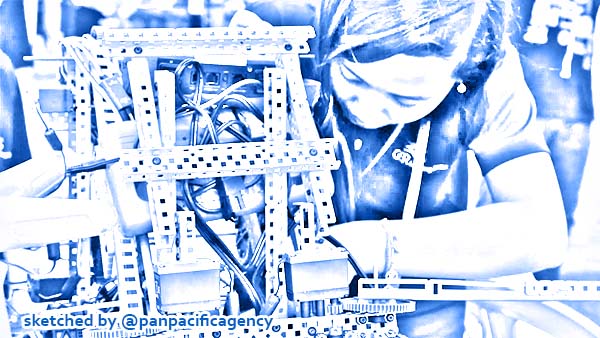[Analytics] Cambodia needs technocratic leaders to stay relevant in Industry 4.0

Shot from the 2017 Cambodia Science and Engineering Festival. Photo: USEmbassyPhnomPenh shared under a Creative Commons (BY-ND) license. Sketched by the Pan Pacific Agency.
In Cambodia, there is an increasing demand for high-skilled laborers as the country aspires to transition to an upper middle or high-income country in the next few decades. Visal Chourn, Kimkong Heng specially for the ASEAN Today.
To realize this vision, Cambodia needs more technocratic leaders who can play a critical role in supporting an effective system of government to drive economic and productivity growth and to move the country forward in the context of Industry 4.0.
Although technocratic governance has been criticized as anti-democratic, technocratic leaders can “bring a reputational advantage both in terms of knowledge and a sense of putting national interests above party political interests,” argued Kevin Featherstone, a professor at the London School of Economics.
A technocracy is a society or government that is run or shaped by scientific or technological experts. In its purest form, it is a system of governance that relies on expert knowledge as a basis for addressing critical issues affecting society.
The benefits of technocracy can be seen in the case of China and its educated, technocratic leaders. For example, Chinese Presidents Jiang Zemin (1993–2003), Hu Jintao (2003–2013) and Xi Jinping (2013–present) all studied engineering, giving them a background in technical education. In Cambodia, the practice of targeting technocratic individuals for leadership has yet to be widely adopted due to nepotism, favoritism and corruption, among other factors.
From a comparative advantage point of view, Cambodia is doing relatively well in the agricultural and tourism sectors, which have contributed to the country’s economic growth over the last few decades.
However, in terms of technology, innovation and industrialization, Cambodia still lags behind many of its ASEAN peers. Cambodia ranked 98th out of 129 countries in the 2019 Global Innovation Index, while Vietnam ranked 42nd and Thailand ranked 43rd. The index rates countries’ performance on human capital and research, knowledge and technology outputs and business and market sophistication.
According to a recent report by the UN Development Programme, a number of barriers prevent Cambodia from exploiting Industry 4.0. These include low investment in research and development, a shortage of STEM (science, technology, engineering and math) professionals, underdeveloped cyber security, limited internet, gaps in language and digital skills and financial constraints, as well as other issues.
Another report, Innovation Policy in ASEAN, published by the Economic Research Institute for ASEAN and East Asia (ERIA), lists Singapore as the only ASEAN country in the “Frontier” phase of innovation, reflecting its advanced research and development capacity—on par with most developed countries in Asia, Europe and America.
The ERIA report labelled Malaysia as in the “Catch Up” phase of innovation, while putting Thailand, Indonesia, the Philippines and Vietnam in the “Learning” phase. Brunei is an outlier in the report, with its own economic model that relies on its abundant natural resources.
Cambodia, however, is listed along with Lao PDR and Myanmar under an “Initial Conditions” phase, indicating its low research and innovation capacity.
If Cambodia is to seriously compete with its neighbours in the region and stay relevant in the era of Industry 4.0, it must reconsider how it approaches its development goals. The country needs to ensure the successful implementation of the Cambodia Industrial Development Policy 2015-2025, while working to train and retain highly-skilled Cambodian workers as well as foreign talent. In a sense, Cambodia must push to produce more technocrats, technicians and knowledge workers.
Approximately two-thirds of Cambodia’s population are under the age of 35. These young Cambodians are undeniably the engine of Cambodia’s economic growth. As the world is changing at a rapid pace and greater attention is placed on technological and economic competition, Cambodia needs to develop a “catch-up” plan by aggressively investing in research and development and prioritizing technology adoption.
To enable Cambodia to catch up with others in the region, the country must direct more investments at skills improvement, research and innovation.
Although there are many challenges ahead, Cambodia’s young population has the potential to help the country “leapfrog” stages of technology and innovation development in the next few decades. There is hope that it can quickly enhance innovation capability by focusing on technological infrastructure and institutional capacity.
Moving forward, Cambodia needs to invest heavily in education, research and technology to produce a highly-skilled workforce and develop leaders who have technocratic skills. The country also needs to promote a culture of technocracy and meritocracy to ensure that it can achieve its vision to become a knowledge-based society.
The question now is: can the principles of technocracy be applied in a context such as Cambodia? Cambodia needs technocratic leaders and technologically skilled workforce to contribute to economic growth and enable the country to catch up with peers in the region.
In the era of Industry 4.0, technocrats play a vital role in providing expert knowledge useful for technological adaptation and social development. They can be a driving force for “quality government”—a government that can provide quality education, better health care, affordable homes, safety and security, more employment opportunities, gender equality and law and order.
Technocratic leaders can play a critical role in supporting an effective system of government that abides by a culture of meritocracy, reducing nepotism and corruption. Cambodia needs to promote technocracy and meritocracy alongside the technological development needed to drive economic growth and ensure competitiveness in the context of Industry 4.0.